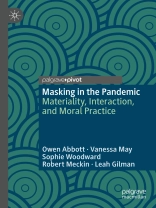This book assumes an “everyday life” perspective towards masking in public spaces in the UK during the Covid-19 pandemic. Facemasks are perhaps one of the most tangible ways in which the changes wrought by the Covid-19 pandemic were made visible. In the space of a few months in 2020, masking in the UK went from being almost non-existent in public to becoming widespread, both before and after the UK government mandated masking in most enclosed public spaces in July 2020. In this context, the speed and scale of the introduction of masking in public settings offers sociologists a rare chance to document the (contested) emergence of a new social practice. The authors argue that the nature of masking during the pandemic means that masking practices need to be understood through the entwinement of material, interactional, and moral dimensions. By developing a relational perspective to explore the relationship between the materiality and moral significance of masking, and how this translated into the development of masking practices in public spaces, the authors argue further that the specific context of masking during the pandemic provides sociologists with a unique lens to think through the nature of material, interactional, and moral practices in general.
Inhoudsopgave
Chapter 1 – Introduction: Masks in the Pandemic, Masks in Everyday Life.- Chapter 2 – Masks and Materiality.- Chapter 3 – Masking and the (Re)making of the Public Realm.- Chapter 4 – Masks, Lay Moralities.- and Moral Practice.- Chapter 5 – Conclusion: Masks and Uncertainty.
Over de auteur
Owen Abbott, Leverhulme Trust Research Fellow, Cardiff University, UK
Vanessa May, Professor of Sociology, University of Manchester, UK
Sophie Woodward, Professor of Sociology, University of Manchester, UK
Robert Meckin, Presidential Fellow, University of Manchester, UK
Leah Gilman, Wellcome Trust Research Fellow, University of Sheffield, UK












